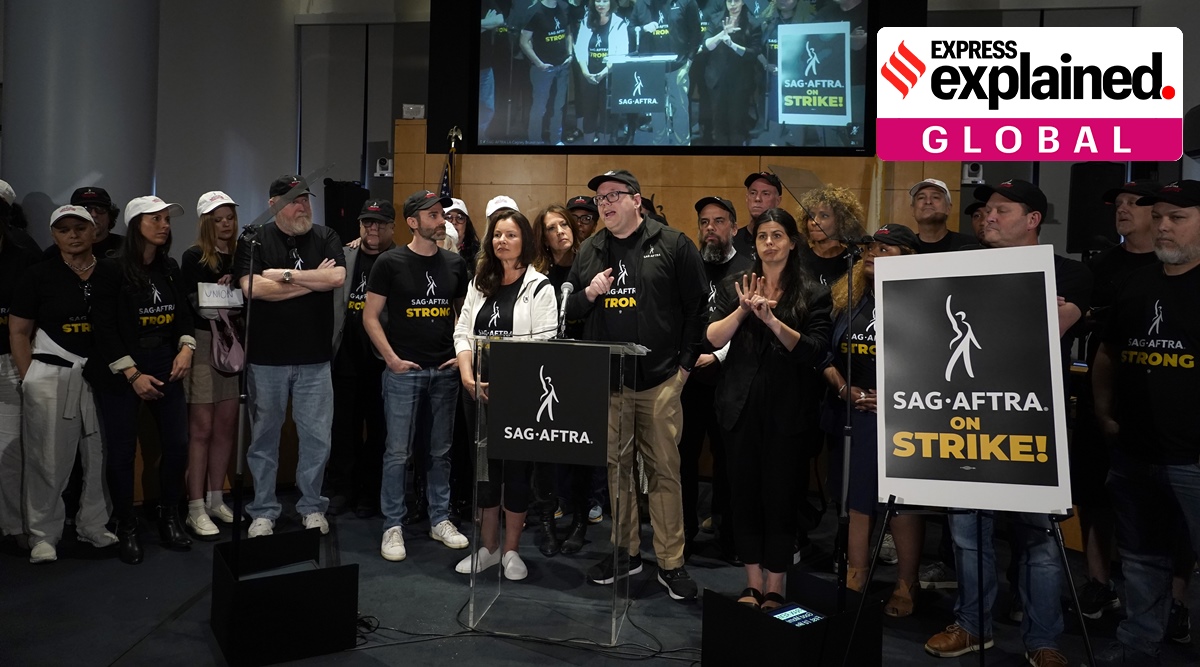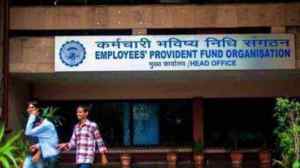Hollywood shuts down: After screenwriters, thousands of film and TV actors go on strike
The actors’ walk-out coupled with the ongoing writers’ strike essentially means that the production of films and TV shows will more or less come to a halt. This is the first time since 1960 that actors and writers have gone on strike at the same time. What are the reasons behind their strike? How long can it last? Which movies and shows will be affected?
 SAG-AFTRA President Fran Drescher, left, and SAG-AFTRA National Executive Director and Chief Negotiator Duncan Crabtree-Ireland, center, speak during a press conference announcing a strike by The Screen Actors Guild-American Federation of Television and Radio Artists on Thursday, July, 13, 2023, in Los Angeles. This marks the first time since 1960 that actors and writers will picket film and television productions at the same time. (AP Photo/Chris Pizzello)
SAG-AFTRA President Fran Drescher, left, and SAG-AFTRA National Executive Director and Chief Negotiator Duncan Crabtree-Ireland, center, speak during a press conference announcing a strike by The Screen Actors Guild-American Federation of Television and Radio Artists on Thursday, July, 13, 2023, in Los Angeles. This marks the first time since 1960 that actors and writers will picket film and television productions at the same time. (AP Photo/Chris Pizzello) More than two months after Hollywood screenwriters went on strike, thousands of the industry’s film and television actors joined them on Thursday (early on Friday in India), following the breakdown of negotiations — over fairer pay and better working conditions — between their union and motion picture studios. Bringing the production of most movies and TV shows to a grinding halt, the action marks the first time since 1960 that writers and actors in Hollywood are on strike at the same time.
Notably, moments after the strike was called on by the Screen Actors Guild – American Federation of Television and Radio Artists (SAG-AFTRA), the union representing 160,000 actors, movie stars, including Matt Damon, Emily Blunt and Cillian Murphy, who were attending the premier of their upcoming movie, Oppenheimer, in London, left the event.
Speaking to the media in Los Angeles, SAG-AFTRA’s President Fran Drescher slammed the Hollywood executives for their greed, saying, “I am shocked by the way the people that we have been in business with are treating us! How far apart we are on so many things. How they plead poverty, that they’re losing money left and right when giving hundreds of millions of dollars to their CEOs. It is disgusting. Shame on them!”
Meanwhile, the Alliance of Motion Picture and Television Producers (AMPTP), which bargains on behalf of Hollywood companies, a trade association that negotiates on behalf of studios, television networks and streaming platforms, claimed “it had worked to reach a reasonable deal at a difficult time for an industry upended by the streaming revolution, which the pandemic sped up” but the actors’ union “has regrettably chosen a path that will lead to financial hardship for countless thousands of people who depend on the industry”, The New York Times reported.
Why have Hollywood actors and writers gone on strike?
The issues that led actors and writers to go on strike are broadly the same. Both the Writers Guild of America, which represents screenwriters, and SAG-AFTRA seek a fairer split of profits and better working conditions. They have complained that especially since the advent of the streaming era, the income of actors and writers has plummeted due to several reasons.
One of them is the drop in residual pay — meaning payments made to actors and writers from repeats of films and programmes they have starred in or have written. “In the old model (the days of broadcast television), they get residuals based on success,” Kim Masters, the editor-in-chief of the Hollywood Reporter, told the BBC. “In the new model, they don’t get to find out what’s going on behind the scenes, because the streamers don’t share.”
Another issue is artificial intelligence. While writers fear that studios will use technology to generate television and movie scripts, actors worry that AI could be used to create digital replicas of their faces and voice without payment or approval.
According to a report by the BBC, studios presented a “ground-breaking proposal” to address the concerns over AI by coming up with certain regulations, however, the SAG-AFTRA’s Drescher rejected the proposal, saying, “They propose that our background performers should be able to be scanned, get paid for one day’s pay, and their company should own that scan of their image, their likeness, and should be able to use it for the rest of eternity… If you think that’s a ground-breaking proposal, I suggest you think again.”
If you want to know more about why Hollywood screenwriters went on strike, click here.
How will the strike disrupt television and movie production?
The actors’ walk-out coupled with the ongoing writers’ strike means that Hollywood has effectively shut down. Even the movies, whose filming has been finished, could face interruptions as actors won’t be available for re-shoots and other filmmaking processes. Moreover, actors will also not be allowed to promote their upcoming movies or attend film premieres — that’s why the star cast in Christopher Nolan’s Oppenheimer left the premier early.
In the case of television, series which are currently being filmed will be interrupted. Moreover, the upcoming Emmy Awards, slated to take place in September, might also get delayed if the strike continues.
The list of movies and television shows delayed as a result of the writers’ strike will get longer now that actors have also stopped working. Some major projects that have been interrupted include, Avatar 3, Captain America: Brave New World, Deadpool 3, Saturday Night Live and other late-night shows, Emily in Paris, The Lord of the Rings: The Rings of Power and many others.
How long can the strike last?
At this moment, it’s hard to give a clear answer. Media reports suggest that meetings between the unions and studios will soon take place but it remains to be seen how quickly they resolve their disagreements — it has already been around 70 days since writers went on strike and no definitive resolution is in sight.
According to another BBC report, the last actors’ strike took place in 1980, when “the two sides grappled with the terms of a new settlement that reflected the demands and concerns of all sides” and it lasted for 10 weeks. The walkout resulted in a loss of about $100m to the industry at that time, which is equivalent to about $370m today.
In 1960, when actors and writers together went on strike, actors didn’t work for about six weeks and writers stayed away for around 21 weeks.
- 01
- 02
- 03
- 04
- 05






































